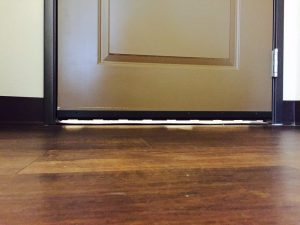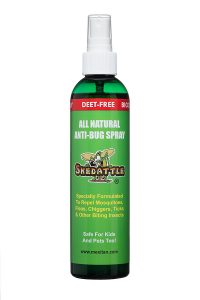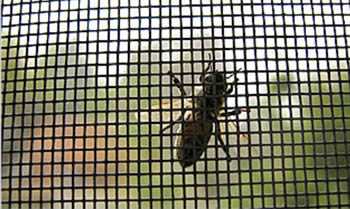When it comes the time of the year when mosquitoes are crowding your home, and you are sick and tired of swatting them and wave them away with your hand, you start looking for other solutions to this problem. There is certainly good reason to — mosquitoes are not only annoying, they carry serious diseases. While controlling mosquitoes in the yard around your home is the best way to address the root cause, you sometimes need to get rid of mosquitoes indoors.
Controlling mosquitoes indoors can be a little more tricky, because you hate to use harsh chemicals or mosquito repellents with deet in an indoor environment. Making sure you have a safe indoor environment is a balance between keeping mosquitos and diseases away, but also making sure that things like drinking water and air quality are top-notch. To that end, we focus many of our tips below on plant-based solutions, as reviewed by the NIH. To help you control the indoor environment for you and your family, we have come up with a list of the ten best ways to get rid of mosquitoes indoors, but first, focus on the obvious fix.
First and Foremost: Fix Your Screens and Doors

It might seem a little old school, but it makes sense. If you don’t want mosquitoes inside your house, don’t give them an easy way to get in.
Many bug and insect issues can be solved through patching obvious gaps in your window screens and doors. If you do not have window screens, get some. You don’t need them for every windows, only the ones you like to have open often. Most houses have windows that came with screens, but in older homes the screens could be missing. It is possible to build your own screens such as with this one which retrofits on any window. You can have them made at a hardware store or by a window installer.
As for screen maintenance, even the smaller tear in a screen is enough for many bugs to enter through. Inspect your screens for holes, if even small. Be sure to fix your screens with a simple patch kit.
Doors are the other place where mosquitoes and bugs can get inside. Anytime you can see daylight around a door, a big can easily get in. Other unwanted pests such as mice don’t need much of an opening to enter, either. Provide a good, sealed a barrier to the outside with a door strip or weather stripping. A good, basic door strip is not expensive and will keep bugs out. It will also give an added benefit of keeping cold and hot air, and even mice, out.
Natural Indoor Mosquito Solutions
Once you have addressed windows and doors, it is time to make sure the mosquitoes that do make it inside don’t touch you or your family. Because we are dealing with indoor mosquitoes, we tend to err on the side of more natural solutions. Nobody wants to be living amid chemicals that could be toxic or harmful, for people or for pets. If you have an opportunity to use a more natural solution, of course you want to. Here are some of our favorite, safe, natural ways to repel mosquitoes inside:
- Ultrasonic Bug or Pest Repeller
- Camphor Oil
- Tulsi
- Dry Ice
- Garlic
- Moquito Traps
- Basil
- Tea Tree OIl
- Coffee Grounds
- Mosquito Repelling Plants
Ultrasonic Bug/Pest Repeller
Ultrasonic repellers have been around in some form for a while, but manufacturers are making them smaller, more attractive, and more affordable today. I think they are some of the better indoor mosquito repellents available. While it is difficult to prove, the ultrasonic devices are said to emote a radio frequency that will be very unpleasant for pests like mosquitos, bugs, and mice. The frequency is not picked up by humans or most pets, so you should not be affected by it. Anecdotes suggest that these repellers work well in many cases, and given that they also might keep mice and ticks away, could be worth a try. Best of all, there is no chemical be released, only radio waves. Find Here.
Camphor Oil
Camphor has been found to have long-lasting effects as a repellant. All you have to do is light camphor in a room with all the doors and windows closed and leave it like this for 15 to 20

minutes (carefully supervised, of course). Your room will be mosquito free in absolutely no time, but it will have a scent that might be foul for you too. You can also just set camphor tablets in a room and let them evaporate over time — it won’t take long. Camphor has many other benefits too, such as being an herbal solution for muscle pain, better breathing, and sedation. Find Here.
Tulsi
Tulsi has been found helpful in killing mosquito larvae and keeping mosquitoes away. In fact, the more people research Tulsi, the more we find that it is really a pretty incredible and widely-applicable herb. Simply plant a Tulsi shrub near your window, as the shrub has properties which prevent mosquitoes from entering your house. Tulsi is an Indian herb which sometimes goes by the name “holy basil”, used for cooking in many Indian dishes. It is also known to be useful in treating mosquito bites when applied directly to the bite area. Find Here.
Dry Ice
Because the carbon dioxide we exhale attracts mosquitoes, we are quite vulnerable to them. Dry ice emits carbon dioxide, and all you have to do is place some dry ice in a container and keep that container some distance away. When you see mosquitoes attracted to the container, close the lid. It can also be a good tactic to employ if you need to keep mosquitoes away from a smaller, contained area. Although it is a time-consuming method, it is quite effective.
Dry ice is not terribly easy to have shipped to you, so we recommend looking for it locally.
Garlic
With a strong pungent smell and mosquito larvicidal properties, garlic is one of the most efficient mosquito repellants on this list. All you have to do is crush a few garlic cloves and boil them in water for some time. Pour the water in a spray bottle and spray it around the room to prevent any mosquitoes from coming near you. Or, if you like cooking with garlic, heat up your favorite garlic-laden dish when you notice the mosquitoes are starting to get bad. Minced garlic is also an option to consider, which can be boiled in water as well. You can get garlic at the grocery store, or find it here and have it shipped to your home.
Mosquito Traps
You can buy mosquito traps from the supermarket, find them online, or even make them at home. We did an entire piece on the Top 5 Mosquito Traps, a couple of which are suitable for indoor use. To make yourself a homemade mosquito trap, you need to cut a plastic bottle in half. Then, add brown sugar in hot water and mix it well. Once the mixture cools, pour it into the bottom half of the bottle and add yeast. Next, put the funnel half of the bottle on the bottom half in an upside down direction (with the bottle cap off). Wrap black tape around the bottle and place it in the mosquito vulnerable area. The solution needs to be changed periodically, according to directions.

Basil
When it comes to more natural solutions for keeping mosquitoes away, basil appears to be a very versatile plant. It shows some effectiveness when used as a simple, standing plant inside your house. Its repellent properties are strongest if used as a topical essential oil, applied directly to skin, but you can also use it in a variety of different ways. What’s more, we all know that basil smells great, some forms of it are excellent as a cooking herb, and there are even some early signs that it may make you protect against colds. Find it here.
Tea Tree Oil
The anti-bacterial and anti-fungal properties of this essential oil make it one of the most effective when fighting off mosquitoes. It’s smell keeps the mosquitoes at bay and all you have to do it dilute a few drops of the oil in a few drops of water and apply this to your skin to prevent mosquitoes from coming anywhere near you. Also known as melaleuca, this oil is also a well-known herbal antiseptic that treats cuts, cold sores, and bug bites. This is another oil that not only can keep mosquitoes away, but can also treat the bite if you are too late to prevent them. Find Here.
Coffee Grounds
Wherever you find stagnant water in or around your house (for example, if there has been heavy rain and you find a puddle of water in your front yard), sprinkle some coffee grounds in it. This will force the mosquito eggs present in the water to float to the surface, and they will be deprived of oxygen, which means that they will be killed before being hatched. Thus, you will have prevented new mosquitoes from being born.
It works on wet, saturated soil as well.
The trick is saving your used coffee grounds, which can be a bit messy or unsightly. But if you are able to store the grounds, this absolutely works.
Mosquito Repellent Plants
We mentioned Tulsi up above, but it is not the only mosquito-repelling plant that can be strategically placed near your door or windows. Catnip and Feverfew are a few plants which can repel mosquitoes, and you can easily plant them in your flowerbed or windowsill to prevent mosquitoes from entering your home. You can even place them in your garden. As for indoors, you might be able to get a house version of the plant, or you can also get the oil from a processed plant to strategically place inside. Just beware – it might drive your cats nuts. Find Catnip Oil Here.
All of these remedies have been proven to prevent mosquitoes from entering your homes, and they are quite successful when used correctly. So, make sure you follow the instructions we have provided, and you will be able to remove many of the mosquitoes in your house. Obviously, these solutions are best done in conjunction with some basic home improvement steps, such as making sure your window screens are all intact and in good condition, and check all of your doors to make sure they completely shut and seal out bugs and air. Also, be sure that the spaces around your doors and windows are well-sealed and there are not gaps. This technique will also help you prevent other infestations, such as those from boxelder bugs, mice, or flies.
How About a Mosquito Zapper?
Bug and mosquito zappers are popular for outdoor use, but there are also some intended to be used indoors, too. In our piece on mosquito traps and zappers, we profiled at least one that is designed for indoor use, the Crioxen. Some will debate that a zapper that kills mosquitoes is not exactly natural, even though you are not introducing a pesticide or insecticide to your home. But if your priority is keeping mosquitoes away from your family at any cost, they may be worth looking into, especially if you find mosquitoes entering your home regularly.
Zappers have come a long way from the huge, loud, bright zappers that we used back in the 80s and 90s. Today’s zappers are smaller, quieter, and much easier to maintain ( which means they are easier to clean). Consider it, especially if your outdoor living space is setup in a way that allows mosquitoes easy access to the inside of your home.
Don’t Forget About Eliminating Mosquitoes Outside

Once you have a mosquito problem indoors, in some ways you have already lost the battle. Mosquitoes in the house are due to mosquitoes around the house. Get rid of the latter, and you will make a huge dent in the former.
The single best thing you can do to prevent mosquitoes once and for all is to break their lifecycle, which means getting rid of any breeding grounds in your yard or around your house. Make sure that you are not creating a welcoming yard or immediate environment for mosquitoes to live and lay their eggs. In particular, do the following things around your home:
- Get rid of standing water in puddles, potholes near your house
- Make sure that water landscape features have fresh, moving water in them
- Clean gutters so they stay dry when it is not raining
- Look for pooling water in places like old tires, buckets, or trees with holes in them. Other usual suspects are bird baths, clogged gutters that create pooling water, and even old wheel barrows that collect significant, stale water in between uses.
Making sure your home does not have a mosquito breeding ground right outside will greatly reduce the number of mosquitoes that make it inside. Check out our other resources, or those from credible sources like the EPA, to get additional information on steps you can take. And don’t be afraid to call-in the professionals — they do that for a living.






